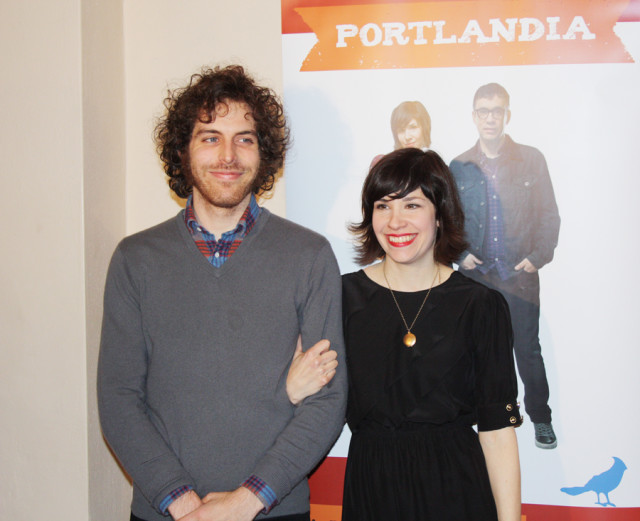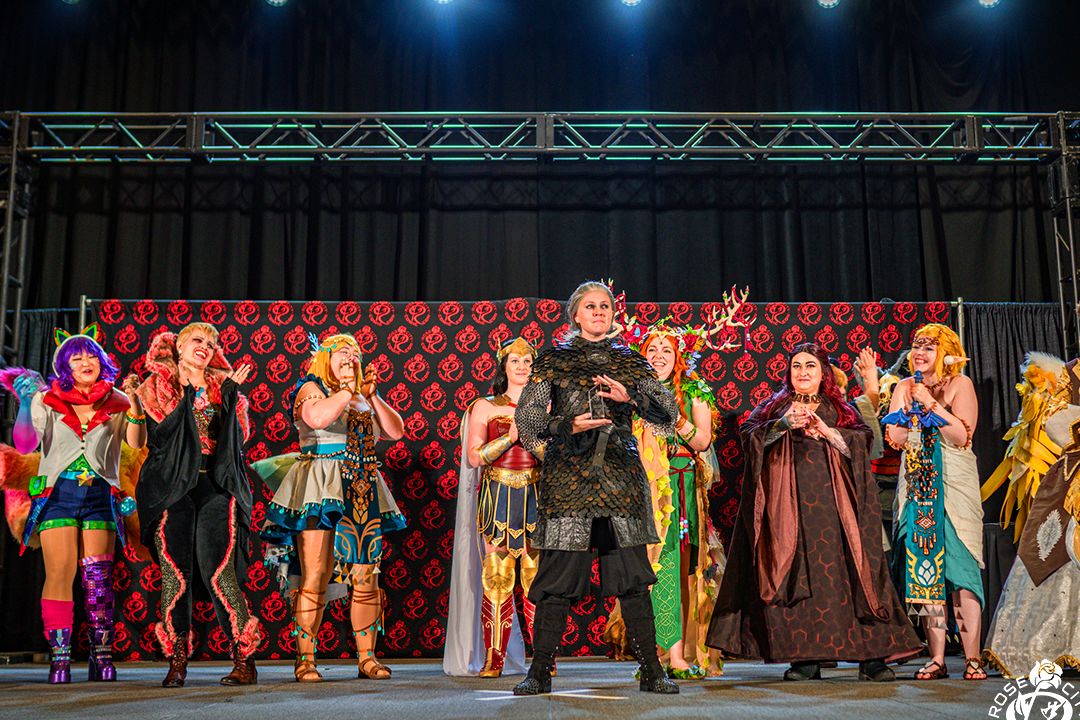Portlandia Premiere

Director Jonathan Krisel and Carrie Brownstein
Image: Eden Dawn
Last night, at the “red carpet” premiere of Portlandia, a tastefully casual Carrie Brownstein and Jonathan Krisel traipsed the (admittedly reddish, but not event-specific) Hollywood Theater rug, and let Culturephile and PM’s style blog Shop Talk pepper them with PDX-centric questions. By the end of the evening, the pair’s charm and sincerity, as well as the genuine funniness of the content they unveiled, had all but completely melted our initial frigid skepticism. But of course, the first thing we had to ask was:
Why did you guys choose to eat Portland Monthly Magazine ?
Jonathan: Um, I think it was just like a quintessential, iconic Portland periodical, and we felt like that’s what we needed for the scene.
Carrie: It seemed less mealy than chewing on the Oregonian, or The Mercury or the Willamette Week. The whole digestive process was easier for me with your magazine. Actually, our art department made those papers out of certain pages, and they’re edible. So they were like these crazy sugar pages. You have a very sweet publication. Not cloying, not saccharine—just a nice balance.
Carrie, I think Portland people have mainly known you through Sleater Kinney. Can you tell us more about your acting experience?
You mean in my life? I haven’t really done acting since I was a kid, except in (local filmmaker) Matt McCormick’s indie film, Some Days Are Better Than Others. But for the most part, in terms of improv, it’s been the sketches I’ve made with Fred [Armisen] over the last couple years, under the moniker ThunderAnt, and then Portlandia. So most of my acting experience is from here.
What’s the difference between LA/NY actors and extras, and Portland ones? Are they less obnoxious in Portland? Is it easier?
Jonathan: Oh, definitely. I mean, we found some great people here, that were amazing. We had Evan Ward’s whole troupe, for instance. And the lady who played the waitress in the first episode—goddamn, she’s so good! I would work with her again in a heartbeat. She’s just awesome. We got a lot of great people. The dynamic was a lot of creative people, doing interesting stuff. There’s a lot of local theater, and then there was the faction of talent that was more commercial, they knew how to do their, kind of, “commercial face,” which was something I wasn’t that interested in—and then there were a lot of people coming from the theater, who were bringing something really real. Simon Max Hill was our casting guy, he’s awesome, he’s from Berkeley, and he was relentless in finding the right people. I’d be like, “I need the real Portland people.” Like, I don’t want the kinda “LA” perfect people, like the actors who are in the Nike commercials or whatever. But, we found them. Also a lot of musicians. We had some local musicians, two Decemberists. We had Corrina Repp, and she was awesome, but her scene got cut…. Everyone here is in a band, right?
Carrie: Many were just local actors that aren’t musicians…but—no, you’re probably right. Probably almost everyone plays an instrument. Yes, they’re probably mostly musicians. Just even from being in the music community and seeing LA/NY versus being in Portland—we wanted this show to be a passion project, and to come to Portland and do things in a way that most TV shows don’t do things. And Portland allows you to do that. It was a really casual environment, you know. All the actors just kind of pulled their own weight. We biked to set! It was all the cliches you would imagine.
There are six episodes now. Are more episodes in the works?
Carrie: If we get picked up for a second season, there’ll hopefully be 10 more. But we haven’t written anything yet.
Carrie, do you think the process of writing will be harder, once you’ve got everyone’s attention? Or will it be easier?
I feel like work should always be hard in some ways, especially creative endeavors. I think, though, that it’s always important to not think about any external definition of what the show is. So next time, the challenge will be to block that out, but there’s plenty more for us to write and explore. We didn’t write these six episodes with any specific audience in mind, only to just have fun and have it be silly—so hopefully we can keep ourselves in that mindframe for next season.
Would you call Portlandia a “mockumentary?”
Carrie: Absolutely not. We are not making fun of Portland. I don’t see Portland people as targets; I think Portland is a launchpad. The ideal sketch for us, starts with specificity and authenticity, veers into the absurd and then goes to the surreal, so that we’ve completely departed from this reality that we live in here in Portland. Because that is not that interesting. We all know the things that are funny and humorous about Portland, but that alone is not enough to base a show on. And also I think that the most interesting comedy isn’t trying to be funny, it’s trying to be serious, and in its effort to be serious, ends up being funny. If people think it’s a documentary—fine. Because then we’ve just achieved total seriousness.
Considering how absurd Portland life can be, are you surprised it hasn’t been singled out in comedy more often?
Carrie: I don’t know. I mean, it’s hard because I live here, so I feel like of course, I ive in a town that’s always commenting about Portland. I mean, as Portlanders, we’re so self-reflective, we’re so analytical, that kind of dialogue is constant. We’re always analyzing ourselves, making fun of ourselves. So, within Portland, it’s been done. We know that that exists. But we were just down at the TCA—the Television Critics thing—and people from the outside world found this very, very new. What I hope for Portland is that Portlandia just becomes part of the dialogue, part of the conversation—that it’s just like a band writing a song about Portland, or a local comedian or filmmaker doing something about Portland. Like, I live here, I’m part of the arts community. I don’t see it as separate from saying, “Well, here’s my version.” As a Portlander, that’s how I feel.
Jonathan: I think the people who are from here will just go, “yes, they got it.” And people from outside will not know if it’s real, or if it’s a super-heightened version of what’s really going on here. The thing is, we heightened it as much as we could, but I think the real thing beats us every time. You can’t beat a vegan strip club. You can’t come up with something better than that. Or like the nude bike ride. I mean, it’s just like, “c’mon.”
C’mon, indeed. For a list of upcoming arts events, visit PoMo’s Arts & Entertainment Calendar!




